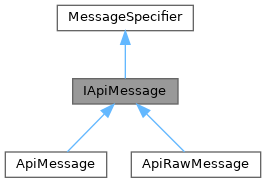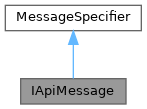Interface for messages with machine-readable data for use by the API. More...


Public Member Functions | |
| getApiCode () | |
| Returns a machine-readable code for use by the API. | |
| getApiData () | |
| Returns additional machine-readable data about the error condition. | |
| setApiCode ( $code, array $data=null) | |
| Sets the machine-readable code for use by the API. | |
| setApiData (array $data) | |
| Sets additional machine-readable data about the error condition. | |
 Public Member Functions inherited from MessageSpecifier Public Member Functions inherited from MessageSpecifier | |
| getKey () | |
| Returns the message key. | |
| getParams () | |
| Returns the message parameters. | |
Detailed Description
Interface for messages with machine-readable data for use by the API.
The idea is that it's a Message that has some extra data for the API to use when interpreting it as an error (or, in the future, as a warning). Internals of MediaWiki often use messages (or message keys, or Status objects containing messages) to pass information about errors to the user (see e.g. Title::getUserPermissionsErrors()) and the API has to make do with that.
- Since
- 1.25
- Note
- This interface exists to work around PHP's inheritance, so ApiMessage can extend Message and ApiRawMessage can extend RawMessage while still allowing an instanceof check for a Message object including this functionality. If for some reason you feel the need to implement this interface on some other class, that class must also implement all the public methods the Message class provides (not just those from MessageSpecifier, which as written is fairly useless).
Definition at line 39 of file IApiMessage.php.
Member Function Documentation
◆ getApiCode()
| IApiMessage::getApiCode | ( | ) |
Returns a machine-readable code for use by the API.
If no code was specifically set, the message key is used as the code after removing "apiwarn-" or "apierror-" prefixes and applying backwards-compatibility mappings.
- Returns
- string
◆ getApiData()
| IApiMessage::getApiData | ( | ) |
Returns additional machine-readable data about the error condition.
- Returns
- array
◆ setApiCode()
| IApiMessage::setApiCode | ( | $code, | |
| array | $data = null ) |
Sets the machine-readable code for use by the API.
- Parameters
-
string | null $code If null, uses the default (see self::getApiCode()) array | null $data If non-null, passed to self::setApiData()
Referenced by ApiMessage\__construct(), and ApiRawMessage\__construct().
◆ setApiData()
| IApiMessage::setApiData | ( | array | $data | ) |
Sets additional machine-readable data about the error condition.
- Parameters
-
array $data
The documentation for this interface was generated from the following file:
- includes/api/IApiMessage.php